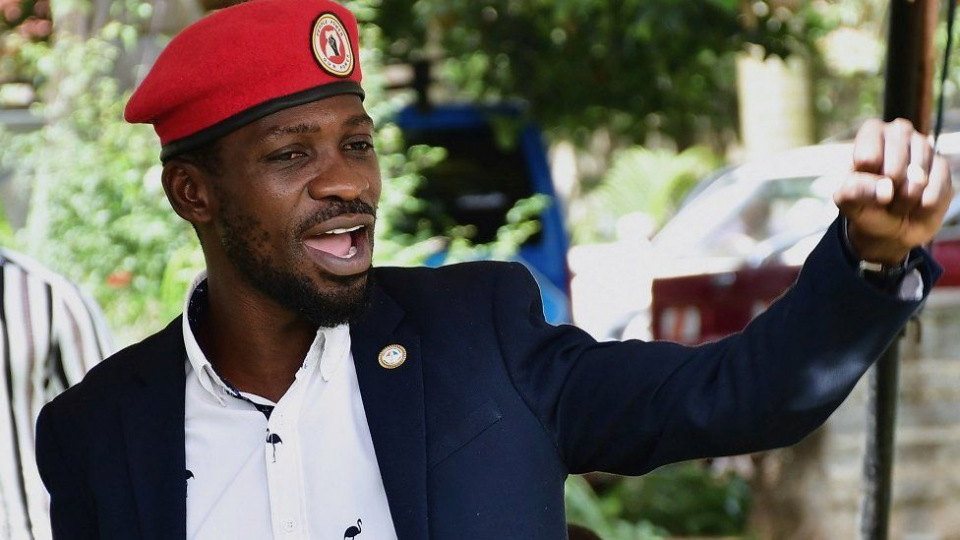Bobi Wine: The Musical Maverick Turned Political Voice
19 September 2023

[Bobi Wine/BBC]
In the vibrant landscape of Ugandan music and politics, one name stands out as a beacon of change and a relentless advocate for social justice. Bobi Wine, whose real name is Robert Kyagulanyi Ssentamu, is a singer, songwriter, and politician who has harnessed the power of music to speak out against corruption and government oppression in Uganda. His remarkable journey, from musical stardom to political leadership, has transformed him into an iconic figure in the nation's history.
Bobi Wine Musical Roots
Bobi Wine was born on February 12, 1982, in the Kamwokya slum of Kampala, Uganda. From a young age, he displayed a passion for music, and by his teens, he had already made a name for himself as a talented rapper and reggae artist. He adopted the stage name ""Bobi Wine"" as a tribute to his love for wine and the ""Bobi"" neighborhood where he grew up.
His early musical career included collaborations with local artists, and he gradually built a reputation for his poignant lyrics and ability to address social issues through his music. Bobi Wine's early hits, such as ""Kadingo"" and ""Bada,"" showcased his lyrical prowess and laid the foundation for his future musical activism.
Bobi Wine Music as a Medium of Protest
His commitment to social justice and his fearless approach to addressing sensitive issues became evident as he gained prominence in the Ugandan music scene. One of his most famous songs, ""Kyarenga,"" released in 2018, exemplifies his musical activism. The song's catchy melody masks its powerful critique of government corruption and the struggle for freedom of expression.
In ""Kyarenga,"" Bobi Wine calls for unity among Ugandans and speaks out against the suppression of dissenting voices. The song quickly became an anthem for those advocating for change in Uganda.
Bobi Wine Musical Collaborations
Throughout his music career, Bobi Wine has collaborated with various artists to amplify his messages of social change. One notable collaboration was with the renowned reggae artist Nubian Li on the song ""Dembe."" The song's title, which means ""Peace"" in Luganda, reflects its message of hope and unity in the face of political turmoil and oppression.
Bobi Wine's collaborations extend beyond music; he has also joined forces with other activists and opposition figures in Uganda to push for political change. His music and activism have converged to form a powerful force for challenging the status quo.
Bobi Wine Political Transition
In addition to his musical activism, Bobi Wine embarked on a political journey that would change the course of his life and Uganda's political landscape. He officially entered politics in 2017 when he won a by-election to become the Member of Parliament for Kyadondo East constituency, representing the National Unity Platform (NUP) party.
His political career, much like his music, has been marked by a commitment to social justice and a fearless approach to confronting the challenges facing Uganda. Bobi Wine has been an outspoken critic of President Yoweri Museveni's government, advocating for political reform, human rights, and greater accountability.
Bobi Wine Music and Politics:
For Bobi Wine, music has always been a medium of expression and a powerful tool for mobilizing people. His transition from a celebrated musician to a political leader has not diminished his musical endeavors. Instead, he continues to use music to connect with his supporters and convey messages of hope, unity, and change.
His songs like ""Tuliyambala Engule"" and ""African Yayo"" have become anthems of political resistance, urging Ugandans to stand up for their rights and demand a more transparent and accountable government.
What Music Means to Bobi Wine
Throughout his career, Bobi Wine has consistently emphasized the role of music as a voice for the voiceless and a force for social change. In interviews and public statements, he has articulated the profound impact of music on society and its ability to inspire, unite, and challenge the status quo.
For Bobi Wine, music has been a vehicle for speaking truth to power, raising awareness about pressing issues, and fostering a sense of community among his supporters. He sees music as a bridge between different segments of society, transcending boundaries and connecting people through shared experiences and aspirations.
Conclusion
Bobi Wine's remarkable journey from a musical maverick to a political voice is a testament to his unwavering commitment to social justice and change in Uganda. His music continues to inspire and mobilize a generation of Ugandans who yearn for a more transparent and accountable government.
As he balances the dual roles of a politician and a musician, he remains a symbol of resilience and hope for many in Uganda and beyond. His fearless advocacy for social justice, his powerful messages conveyed through music, and his dedication to challenging government oppression make him an iconic figure in the ongoing struggle for a more just and equitable Uganda. Whether on the stage or in the political arena, his voice remains a powerful force for change.





Leave your comment